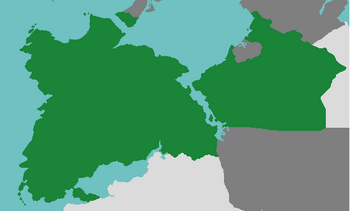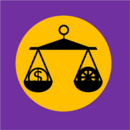Mesoland
United Communities of Mesoland Vereinigte Gemeinschaften Mesoland | |
|---|---|
|
Flag | |
| Motto: "We walk always, together always" | |
| Anthem: Rise, Mesoland, rise | |
 | |
| Capital and largest city | Tabarak |
| Official languages | English, German |
| Recognised national languages | Dutch, Mesozulu |
| Recognised regional languages | Nika, Hambatsu, Japanese, Korean |
| Ethnic groups | 31.76% Black 30.41% White (12.11% Germanic 8.15% Anglo 7.34% Afrikaner 2.81 Other) 27.92% Two or more races 7.74% Asian 0.48% Native Meso 1.69% Other |
| Demonym(s) | Meso |
| Government | Federal Parliamentary Republic |
| Alexander Harris | |
| Kechi Agbobo | |
| Nyara Lasengara | |
| Tyrus Roland Green | |
| Legislature | Federal Parliament |
| Establishment | |
| 1st June 1722 | |
| 15th January 1741 | |
| Area | |
• Total | 8,145,000 km2 (3,145,000 sq mi) |
• Water (%) | 1.3% |
| Population | |
• 2019 estimate | 276,242,954 |
• Density | 33.9/km2 (87.8/sq mi) |
| GDP (PPP) | 2019 estimate |
• Total | $7.773 trillion |
• Per capita | $33,950 |
| GDP (nominal) | 2019 estimate |
• Total | $7.159 trillion |
• Per capita | $32,000 |
| Gini | 33 medium |
| HDI | 0.871 very high |
| Currency | Mesoland Dollar (MZD) |
| Time zone | MST (Mesoland Standard Time) |
| Date format | dd-mm-yyyy AD |
| Driving side | left |
| Calling code | +28 |
| Internet TLD | .mz |
Mesoland, officially the United Communities of Mesoland or Vereinigte Gemeinschaften Mesoland is a large federal parliamentary republic in the east of Astyria. It comprises of 20 provinces and covers an area of 8,145,000 square kilometres (3,145,000 square miles) with a population of about 276 million inhabitants. Situated primarily on the continent of Ixalia, Mesoland is split into western and eastern parts separated at the narrowest point by a 30km stretch of water at the mouth of the Barrington Sea. Mesoland shares land borders with Zitru to the southeast, Nova Deseret to the northwest and San Joaquin Valley and Caprica to the northeast. Mesoland is a highly multicultural and multiracial country in which no majority race exists, hundreds of years of wide scale immigration from across the globe helping to create one of the most racially varied nations on the planet. Mesoland's capital and largest city is Tabarak, home to more than 33 million inhabitants within the city limits alone. Other major cities include Ilungwe, Foxburg, Union City and Port Rogan.
Fossil records indicate that Mesoland has been inhabited by humans for more than 30,000 years. Migration to Mesoland began as early as the 7th century AD with the first Afro settlers arriving from territories in the far east. Large scale Afro migration to Mesoland continued until around the 16th century around which time white settlers, mainly of Germanic, Dutch, Anglo, Gaelic and French descent, began to arrive in Mesoland, a trend that continued well into the 20th century. During this period of colonisation, millions of native Mesos were wiped out by foreign disease and conflict and were marginalised by migrant communities as they spread across the area that now comprises Mesoland.
For much of recent history, Mesoland was made up of a number of independent factions and kingdoms, often at war with one another over racial and territorial divisions. By 1650, however, a black majority kingdom, the Masha Kingdom, began to emerge as a dominant force in the region, spreading from its roots in the north west southwards and by the early 18th century ruling over the land comprising modern day Mesoland. Following the Meso succession crisis of 1722 and the subsequent collapse of the Masha dynasty, a republic was declared by The 1722 22, the name given to the 22 landowners and businessmen who reached across racial and tribal divides to attempt to form a democracy in response to the instability that gripped Mesoland following the collapse of the Masha rule, and Mesoland was founded on the 1st of June 1722. The early phase of the republic was marred with conflict and secession attempts as the first Meso government, with 10 of the 1722 22 in senior positions, refused to release its grip on power until 1740 when the first democratic elections were held in the wake of a successful coup led by 8 members of the 22 who had not been involved in the first government. From this point, Mesoland ushered in a period of industrialisation and great cultural and economic enlightenment, further immigration helping the economy to soar and allowing Mesoland to emerge from the 19th century as a great Astyrian military, economic and cultural force.
In the present day, Mesoland is a wealthy, highly developed nation with a high quality of life and high life expectancy. Mesoland ranks highly in various measures of prosperity including GDP per capita, production efficiency, transport efficiency and happiness. Tabarak is a global financial centre with over 200 international corporations headquartered in the city and an average wage in the top percentile of the world. Mesoland's largest economic sectors are services and information technology, although manufacturing and agriculture feature to a great extent. Mesoland has one of the highest military expenditures by percentage in Astyria at 4.2% and has a modern military comprising of upwards of 950,000 troops.
History
Geography, climate and environment
Demographics
Government and politics
Law enforcement and crime
Economy
Infrastructure
Education
Culture
Sports
Science and technology
Health

